With their long, floppy ears that reach the floor, short legs, and wrinkly faces, Basset Hounds might look like the laziest dogs out there. Still, they are among the most beloved family pets everywhere you look.
In fact, these pups are not as calm as one might think. They have a high prey drive, something they carry from their hunting dog ancestors.
These dogs come from France, where they were used as hound dogs for trailing hares. From there, these French dogs were brought to England, where they were loved for their similarities to the St. Hubert’s Hound.
Basset Hound dogs were kept because hunters could easily keep up with them, and for their amazing sense of smell that only Bloodhounds could match.
Unfortunately, the Basset Hound lifespan is one of the traits many dog owners are worried about.
What does this mean? What issues lie with this dog breed, and are there any health issues you need to be aware of?
If these amazingly adorable doggies interest you – here’s all you need to know about the Basset Hound lifespan and how can you ensure your pooch lives long and healthy life:
How Long Do Basset Hounds Live?

The average life expectancy of a Basset Hound is 10 – 12 years.
While this sounds like a fairly long lifespan, they live short compared to the most famous scent hound – the Beagle, which has an average lifespan of 12 to 15 years.
In fact, this isn’t a long lifespan for a small dog. as they tend to live longer than large dog breeds, such as the Great Danes. Many small breeds tend to live much longer – some Shih Tzus, for example, will live to reach their 20th birthday!
Why do these small game tricolor dogs live so short? I’ll try to give you the best answer possible, but there are a few things you need to be aware of.
Factors That Affect The Basset Hound Lifespan
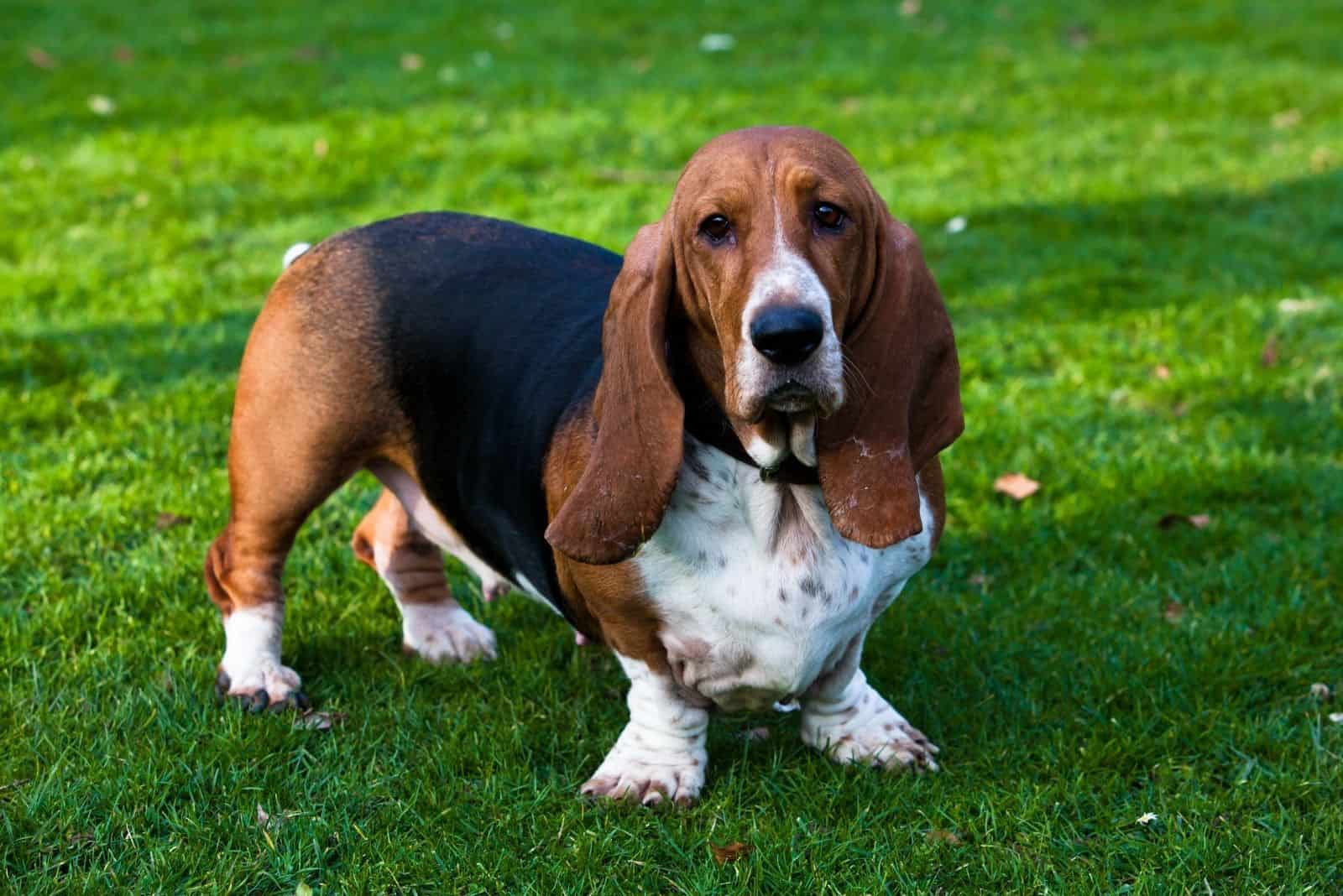
There are many factors that affect how long a dog will live. Whether we are talking about the Basset Hound breed or any other dog, it’s important to note that genetics and proper care play the main role.
Here are a few things that are affecting your Basset Hound’s lifespan – in both good and a bad way:
Size
The size of the dog breed can greatly affect its lifespan.
While we’re still lacking proof of why this is so, it’s easy to notice how most small breeds are living much longer than large dogs.
Just compare Chihuahuas and Mastiffs! While small Chis can easily live to be 16 or 17, many Mastiffs die before their 8th birthday.
One of the supposed reasons for this is that large dogs grow much smaller than smaller ones.
All puppies are born of a fairly similar size. There isn’t a huge difference between a newborn Chihuahua puppy and a newborn Mastiff puppy – at least not compared to the adult dog size.
However, by the time they reach one year of age, Mastiffs will already be around 30 inches tall, while Chihuahuas will still fit your purse.
This rapid cell growth is connected with many health problems – most notably, cancer. Many experts believe this is the reason why large breeds tend to have more health issues than small breeds.
As Basset Hound is a small dog, this is a big advantage he has.
See Also: Basset Hound Growth Chart: How Big (And Long) Do They Get?
Health
The breed’s predispositions to certain health conditions will greatly affect the dog’s lifespan.
Reputable breeders are doing all they can to eliminate health problems from the dog’s bloodlines. They will only breed healthy dogs, ensuring no bad genes are passed onto the offspring.
Unfortunately, there are many health conditions that do affect the Basset Hound lifespan. I’ll talk in greater detail about them later on.
Spaying/Neutering
The British Veterinary Association conducted a study that tried to see whether there is a connection between fixing canines and their lifespan.
This research showed that spayed females seem to live the longest, while intact females lived the shortest. Neutering a male dog would increase his lifespan, but not as significant as is the case with females.
Still, neutering and spaying pets will eliminate the risk of many health problems, especially some types of cancer and pyometra.
As long as you choose a responsible vet who won’t endanger your dog’s life during the procedure alone, it would be wise to spay or neuter your Basset Hound.
Diet
A proper diet can help your dog live healthily – however, there are some disagreements about what the proper diet for dogs should be.
Some people prefer to feed their dogs raw dog food. They consider dogs carnivores, just like their wolf ancestors.
Others consider dogs omnivores and love to add some fruits and veggies into their diet.
Some dog owners even feed their dogs with vegan dog food!
No matter what you choose, you need to provide your Basset Hound with a balanced diet. This means lots of healthy animal proteins, some healthy fats, and very few carbs – with preferably no sugar.
Basset Hounds are prone to obesity, something I’ll touch upon a bit later. Still, a proper diet is essential for their well-being, so this is something you should really be mindful of.
Never add changes to your dog’s diet or try any non-traditional feeding method before you consult with a veterinarian.
Some dogs have health problems you might not be aware of, or they might have certain food sensitivities. If you don’t ask your vet to conduct a health check-up, you might do your dog more harm than good.
Stress
Finally, your Basset Hound should live happily, as stress can increase the chance of many health conditions.
Provide your pooch with much love and good care, and your doggie will reward you by staying with you for as long as possible.
Basset Hounds are sensitive dogs that love their owners with all their hearts – although they are a bit slow on feet to show you that. If you make sure they live carefreely, the chance of some health issues will greatly reduce.
Basset Hound Health Problems
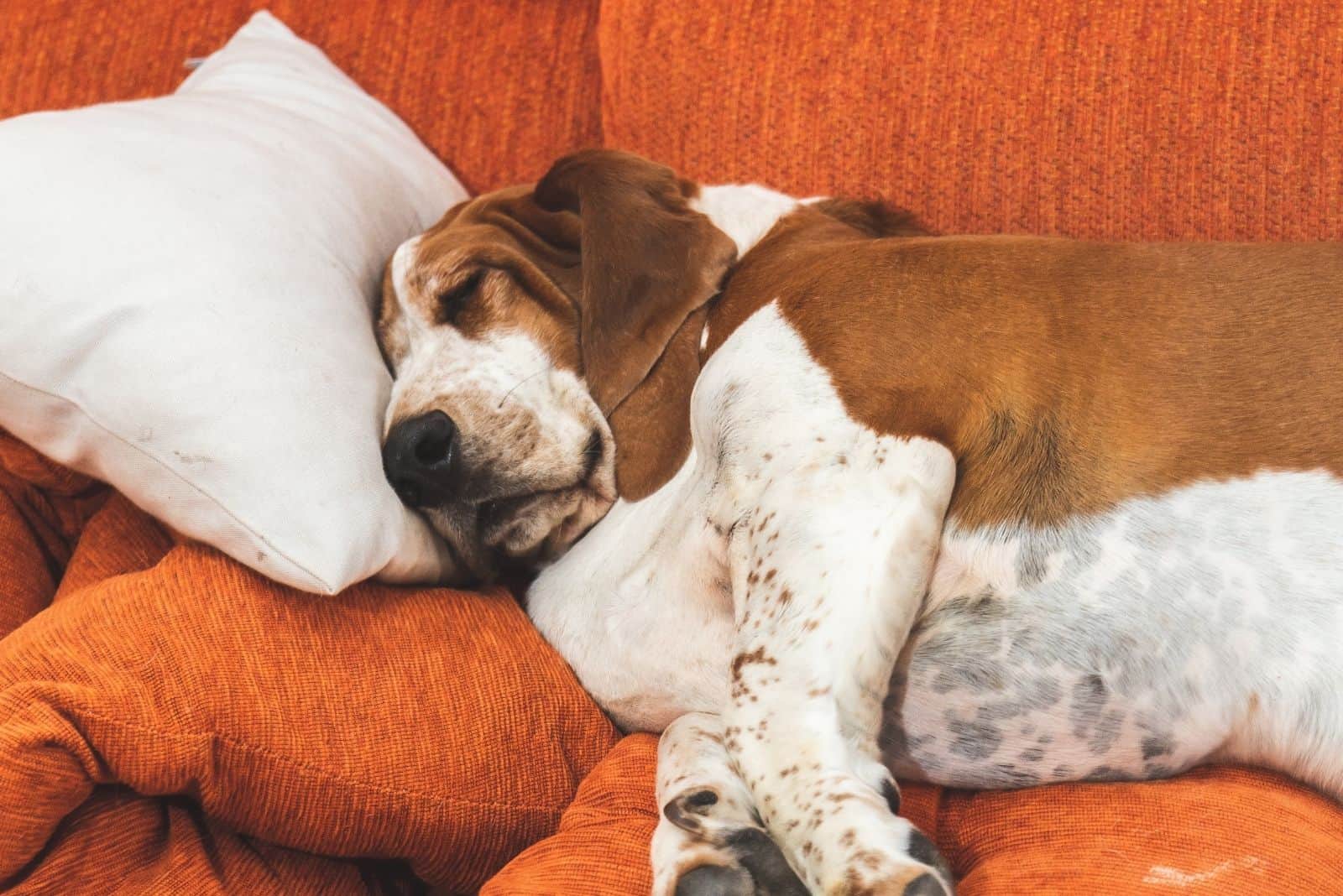
The main reason why Basset Hounds don’t have as long a lifespan as some other similar dog breeds is that they are prone to many health problems.
Not all health issues Basset Hounds can have will directly cause your pooch to live a shorter life. However, they can ruin his quality of life, which can lead to many owners euthanizing their Basset Hounds to stop their suffering.
Some conditions are the result of genetics and they spread through generations. Others are the product of the Basset Hound build – most notably, his short legs, long body, and extremely long ears.
The list I’ll give you below isn’t to scare you from buying your new Basset Hound puppy. However, it’s always good to know what you’re getting into, and what you need to be mindful of.
Many of these conditions are easily treatable if detected on time. You need to know the warning signs.
Here are some of the health problems your Basset Hound dog might be prone to:
Hip And Elbow Dysplasia
Both hip dysplasia and elbow dysplasia are some of the most common orthopedic conditions in dogs – especially in large dogs and in dogs with short legs, such as Basset Hounds.
They occur when the socket and the ball of the dog’s joints haven’t properly developed. This will cause the entire joint to become loose, and the hip or the elbow can fall out of the joint.
If left untreated, dysplasia can cause scar tissue to form on the joint, ruining the dog’s ability to walk. Over time, this can lead to arthritis.
The main cause of hip and elbow dysplasia is genetics, which is why you need to buy dogs that have been approved by the Orthopedic Foundation of Animals (OFA).
Some signs of hip and elbow dysplasia are:
• Limping.
• Signs of pain.
• Inability to move legs properly.
• Your Basset Hound’s joints might produce a clicking sound.
• Lethargy.
Unfortunately, there is nothing you can do to prevent the occurrence of hip dysplasia if the dog has the genes for it.
However, by feeding your dog a propper diet and keeping him from being obese, you can keep your pooch from developing it too early.
Also, as Basset Hounds have short legs and long backs that are the result of a specific type of dwarfism, his joints already don’t function the same way as joints of other, larger breeds.
You need to keep your Basset Hound from jumping too much, and you need to be mindful of harnesses you’re using, as there shouldn’t be any unnecessary strain on his joints.
Hip dysplasia won’t directly shorten a Basset Hound lifespan, but if the condition goes so out of control that not even pain medications can help manage it, most vets will recommend euthanasia.
Patellar Luxation
Patellar luxation is another common orthopedic condition, and Basset Hounds are prone to it due to their short stature.
The name of the condition stems from two words: Patella, which is a science word for the kneecap, and luxating, which simply means ‘dislocated’.
As you can conclude, this condition is what we call a dislocated knee. It means that the dog’s knee joint is often falling out of his position.
Over time, the dog will learn how to return the knee to its standard position on his own rather quickly.
As such, the main thing you might notice is your dog suddenly running on three legs for a few seconds, or he’ll make a short skip. Then he’ll be back to running regularly, without any sign of pain.
Most of the time, patellar luxation won’t cause any long-term issues. Many Basset Hounds can deal with this throughout their life without being affected too much.
However, patellar luxation can increase the chance of other forms of injuries, as well as arthritis. The best option is to provide your dog with surgery that can help correct the condition.
Osteochondritis Dissecans
This is yet another orthopedic issue Basset Hounds are prone to.
It occurs when the cartilage separates from the bone. This mostly occurs on the dog’s shoulder, but any joint can be affected, including the elbow or hip.
Osteochondritis Dissecans (OCD) is a progressive disorder that will usually affect puppies, but it can occur in adult Bassets, as well.
It isn’t entirely known what’s causing this condition, but it seems that Basset Hounds that get too much calcium supplements are more prone to it than dogs with a standard diet.
Some of the signs of OCD include:
• Limping.
• Leg lameness.
• Swollen joint.
Milder forms of OCD can be treated if your dog rests for a while. Other forms might require medication, while the most severe ones will require surgery.
Eye and Ear Problems
Basset Hounds are prone to various health conditions due to their droopy faces, including not just skin issues but several eye conditions, as well. The most common one is glaucoma.
Glaucoma is optic nerve damage that occurs from increased eye pressure caused by improper fluid drainage.
This is a progressive disorder that often leads to damage of the retina and optic nerve. Even with proper treatment, about 40% of dogs with glaucoma will lose vision on the affected eye, but the earlier the condition is detected, the higher the chances of recovery.
Some of the warning signs include:
• Eye rubbing.
• Watery discharge.
• Cloudy appearance to the eye.
• Eyeball bulging.
• Eye swelling.
• Pupils that don’t respond to light properly.
Also, due to their large, floppy ears that often touch the ground, Basset Hounds are prone to ear infections. Their ears are so long that the dog’s drool can get into them, causing irritations!
If you notice any redness on your dog’s ears, hair loss, or if your pooch is scratching too much, take him to the vet.
Ear infections might lead to deafness if left untreated. Even if they don’t become so drastic, they’ll cause your dog great discomfort.
Von Willebrand’s Disease
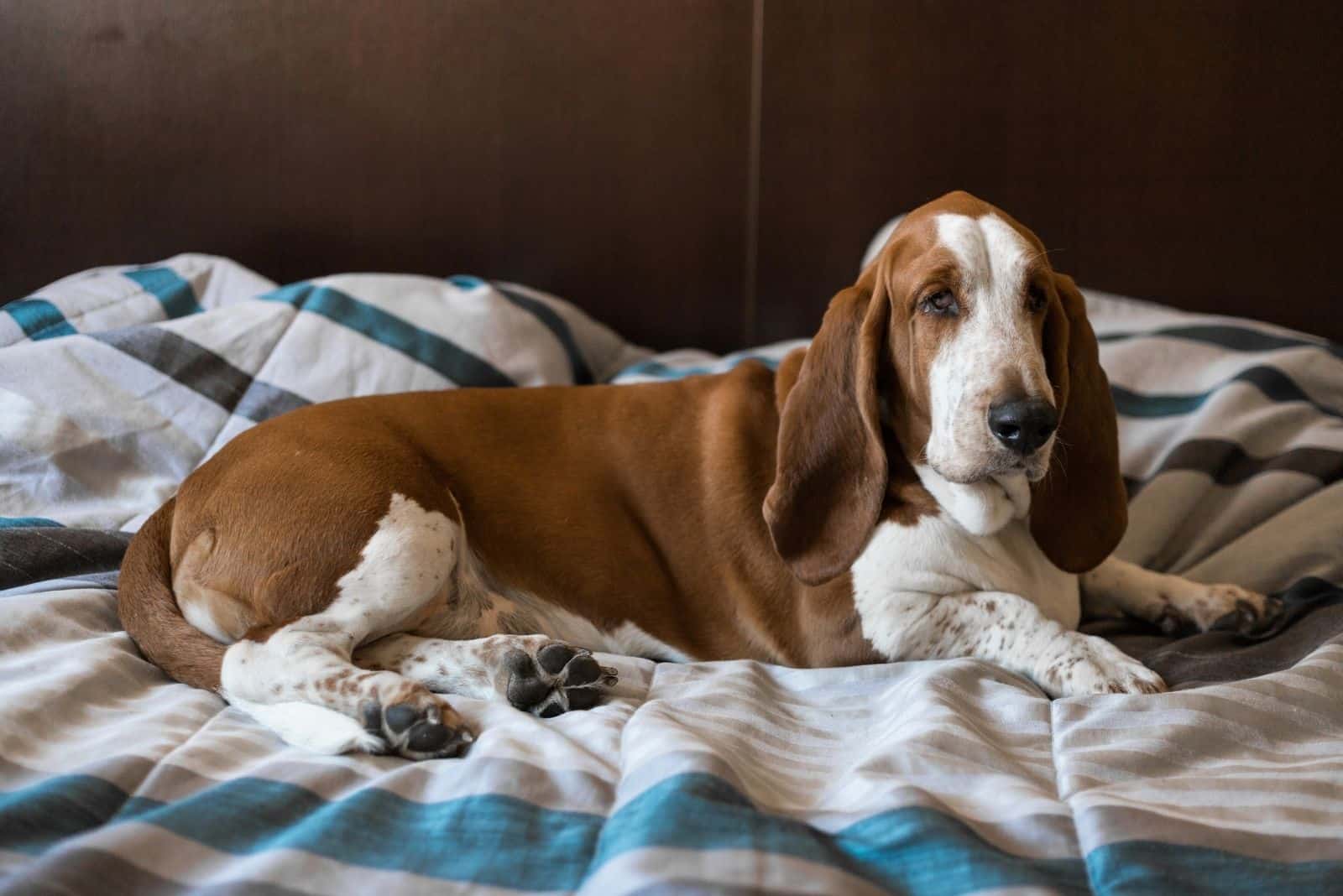
Von Willebrand’s Disease (vWD) is a genetic health condition that’s caused by the deficit of blood protein called von Willebrand.
It’s very common in Doberman Pinschers, but Basset Hounds can also have it.
This disease keeps the dog’s blood from clotting, causing prolonged bleeding.
While vWD cannot be cured, it can be managed with proper treatment and medication. However, the dog needs to be kept safe from any injuries, and surgeries might be risky.
Most of the time, vWD will remain undetected until the dogs start bleeding. He might bleed after trauma, or the bleeding might occur spontaneously, from the body regions such as gums, nose, and vagina.
Dilated Cardiomyopathy
Dilated cardiomyopathy (DCM) is the main cause of reduced Basset Hound lifespan.
This is a health condition that leads the heart to be enlarged, causing progressive failure of the heart muscle. If left untreated, it can lead to death.
This is a genetic health condition that cannot be prevented, and even some dogs who don’t appear to have cases of DCM in their bloodlines might still get it. It is common in most hound dog breeds, but it’s especially prominent in Basset Hounds.
The early stages of DCM don’t have noticeable symptoms and the only way to detect the condition is when you take your dog to the vet for a regular check-up.
During the later stages of the condition, your dog might experience:
• Weakness.
• Fainting.
• Difficulties breathing.
• Coughing.
DCM can lead to sudden death from heart failure, even if the dog never expressed any symptoms.
Gastric Torsion
Gastric dilatation – volvulus, also known as bloat, is one of the deadliest health conditions in dogs.
Bloat occurs when your Basset Hound’s stomach fills with food, fluid, or gas, and then twists. This twisting of the stomach is often deadly, even with surgery, as it impacts the blood flow and results in shock.
Bloat occurs without any warning, and it can take your dog’s life in a matter of hours.
There are no warning signs of bloat. However, there are several risk factors you might want to keep in mind, such as:
• Eating food too quickly.
• Overeating and drinking too much water.
• Stress.
• Exercise and playtime right after mealtime.
• Raised food bowls.
• Genetics.
• Old age.
Fortunately, bloat isn’t as common in Basset Hounds as it is in many other dog breeds. Still, there is a possibility of your Basset getting it, which is why I wanted to include it.
Thrombopathia
Thrombopathia is a condition common for Spitz dogs and Basset Hounds.
It’s very similar to vWD in that it keeps the dog’s blood from coagulating. Their wounds don’t clot, which can result in excessive bleeding and even shock.
Some signs of thrombophatia include:
• Excessive bleeding.
• Bleeding from the nose or gums.
• Bruises and hematomas on the skin.
• Excessive bleeding during estrus.
• Blood in stool and urine.
Many signs of thrombopathia are similar to those of vWD. The vet will conduct various tests to check which one of the two conditions is causing your pooch to bleed.
Cancer
Fortunately, Basset Hounds are not as prone to cancer as many other breeds. However, they are still prone to skin squamous cell carcinoma.
These tumors usually appear on the dog’s head, rear, abdomen, and lower legs. They look like raised lumps that remain firm to the touch.
Fortunately, this condition is rarely found on young dogs, and early stages respond well to surgery.
Obesity
Obesity is a huge problem in Basset Hounds, as these dogs are known for being laid-back family dogs with low energy levels that love to eat.
Obesity might be the most dangerous of all health problems I’ve mentioned, as it can lead to most other health issues on this list, especially orthopedic and heart problems.
When a dog is overweight, his body will place additional pressure on his heart and bones. This will cause the blood to struggle to pump blood, and the bones might be too brittle to hold all that extra weight.
Obesity can greatly reduce the Basset Hound lifespan, as overweight dogs tend to live up to several years less than dogs with the weight that follows the breed standard.
How To Ensure Your Basset Hound Is Healthy?
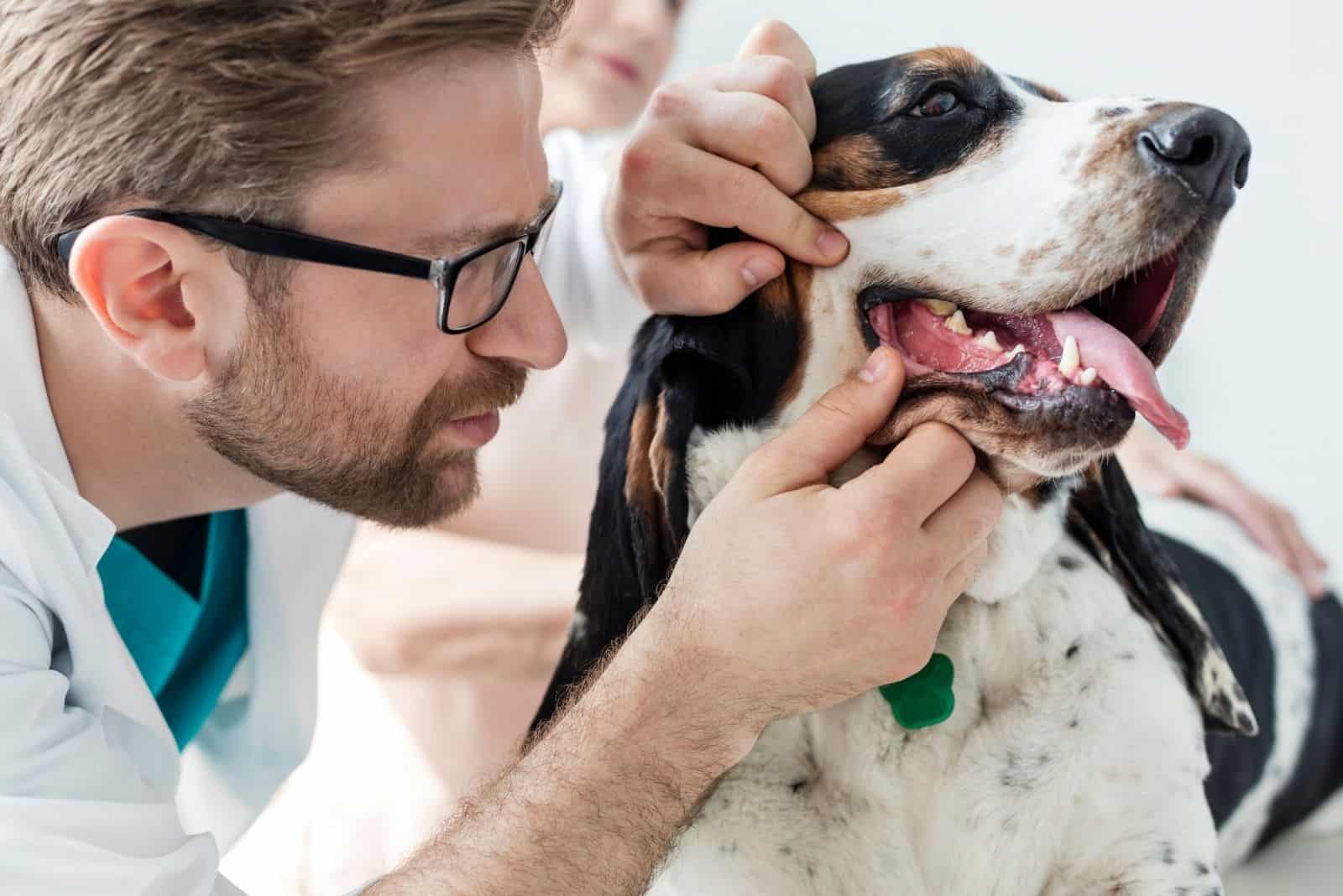
There are a few things you can do to help your Basset Hound live a long and healthy life.
The first and most important thing is to make sure you buy your new Basset Hound puppy from a reputable breeder.
A reputable breeder will conduct various tests to make sure all his puppies are in great health. They won’t breed dogs with genetic conditions to make sure the offspring is healthy, as well, and many will even provide you with health guarantees.
You’ll recognize good breeders as they are recognized by both the American Kennel Club (AKC) and the Basset Hound Club of America.
While you can adopt a purebred Basset Hound from a rescue group, it’s important to note that many of these dogs come from irresponsible breeders or puppy mills, which means they might have some genetic health problems.
If this is the case, make sure your Basset Hound gets the best health care possible. This way, even if your pooch happens to have some condition, he’ll still live long and happily.
You should provide all your dogs with regular exercise and high-quality dog food. The combination of these two will keep these pups from being obese, which is great for his health.
Accessibility is also important for a long Basset Hound lifespan, as your short-legged best friend might not be able to go wherever they want in a safe way.
Make sure you have a proper harness for these dogs, and that they don’t have to go over the stairs to get by. They also shouldn’t jump on and from high places, such as a king-sized bed.
You should also spay or neuter your Basset Hound, as this can help him live longer. Many reputable breeders will demand this either way.
Basset Hound Lifespan – Bottom Line
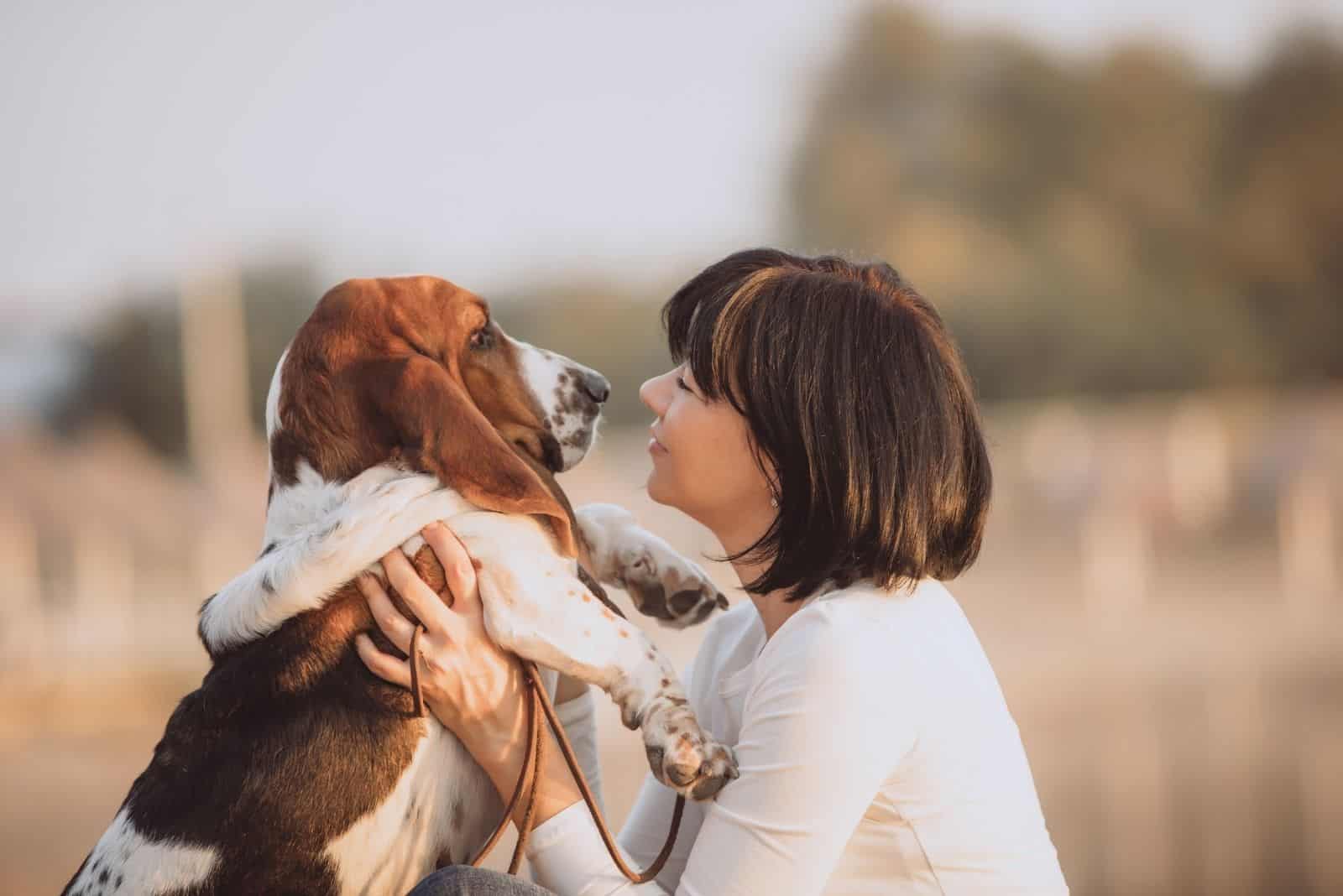
Basset Hounds are amazing family pets that were initially bred to be working dogs – something that isn’t easy to conclude when you notice how slow-paced and laid-back they are.
Unfortunately, Basset Hound lifespan is shorter than the life expectancy of many other hound dog breeds, but this is something you can manage with just a few tips and tricks.
All dogs make amazing pets, no matter how long they stay with us. Still, you should always have a good vet on the speed dial, as this can mean life and death.
Provide your Basset Hound with lots of love, and help him be as active as he possibly can – but make sure you don’t put too much pressure on his short legs. Feed him good dog food, and don’t miss annual check-ups.
With just a bit of care and affection, your Basset Hound can live a long and happy life. These are amazing dogs that won’t let even their health conditions stop them from cuddling with their family members.

